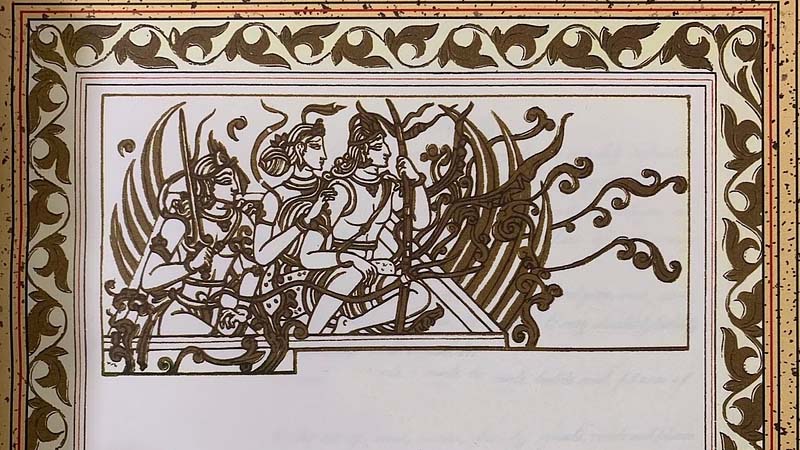Letter III
My dearest Lord Rama,
With a heavy heart, I come to you today seeking solace and comfort. I am sorry for the delay in writing to you, but I have been carrying a heavy burden in my heart, and I couldn’t find the words to express it until now. The past week’s events have left me deeply shaken and saddened, and I am filled with anguish as I witness the injustice taking place. It all started when our brave women athletes, who had brought laurels to our country, spoke out about the sexual harassment allegations against BJP MP, Brij Bhushan Sharan Singh. They demanded that the State take action and address the issue, but their cries for justice have fallen on deaf ears. Instead of investigating the allegations, the media is questioning their motives and intentions, adding insult to injury.
Having a conversation with you feels important to me. That has made me think about how politics and spirituality can be reconciled to achieve social justice in a modern democratic state.
For we Indians, spirituality and even its politics have often been defined by the idea of Ram (you). Decoupling politics and spirituality seems like a ‘fool’s paradise”. Spirituality and politics are intertwined in more ways than one. I wonder if spirituality is a way to look inside while politics is a way to bring social justice to our communities.
Gandhi’s Ram perhaps played a crucial role in his resolve to unite Indians against colonialism.
Bhakti is a spiritual path that defines the relationship between the devotee and the divine. Raghuveera, if your maryada defines politics, then selfless and unconditional love of Hanuman defines Bhakti.
Like the Kings of Spirits tells Hanuman,
“There are many rings of Ram, and find the one which belongs to your Ram”.
We must find our “Ram” that defines our relationship with the divine and calibrates our politics.
How does one define Bhakti? Is Bhakti just a sense of servitude and surrender to the divine? Instead, it is better described as a two-way conversation between the individual and the divine.
I am sure you know that in our Capital city, Bajrang Punia, Sakshi Malik and Vinesh Phogat, three wrestlers are alleging severe crimes against the minister. These are mere allegations, but these sportsmen deserve respect, and their plea must be heard. Many Akhadas have a Hanuman idol. Why hasn’t an investigation been initiated by a BJP that uses your name and the motif of Hanuman for strength (instead of devotion!!)
Dear Sarva-jana-priya (or “Beloved of everyone”),
How do we introspect, converse among ourselves, and reclaim that Ram is love and Hanuman is devotion? Asking young men to take arms and become vigilantes. Hanuman could not have inspired them. My only conclusion is that we need to introspect. Falling in love with Ram should fill you with joy and not anger.
I can narrate the story of Hanuman, which is found in the Uttara Kanda, the final book of the Valmiki Ramayana. The story of Hanuman’s interaction with Ram exemplifies the idea of devotion and Bhakti.
In ancient Hinduism, the Aswamedha Yagna lets a horse wander for a year while a team of warriors follows it. When a horse enters a foreign land, the king must capture it and engage in battle with the warriors.
Lord Ayodhya-natha (“the Lord of Ayodhya.”), You performed the Aswamedha Yagna after Your return to Ayodhya from Lanka. Daring it may be, you were stopped by two young warriors who defeated your army, your general and your soldiers. In the fervour of anger, you shot an arrow to kill the indignant young warriors. The young children were your children, Luv and Kush.
Will a Father kill his children? How do we stop this: Hanuman flies across the sky and opens his chest to receive your arrows; His chest has an image of “You, Raguveera and Sita”.
Hanuman protects your children, Luv and Kush.
It seems miraculous that your weapons which are the most powerful of all, can be rendered ineffective by Hanuman; Hanuman is the epitome of Bhakti. The story is powerful to us. Bhakti of Ram is more potent than Ram himself. Ram Bhakt Hanuman can confront the King of men, Ram. Hanuman’s devotion does not seek power but seeks a path to converse with Devine.
Bhakti must be an internal conversation with the divine and a personal journey. However, Hanuman has become a mere emblem of intimidation, which goes against the very essence of Bhakti. As followers of Ram, we must reflect on whether we are deviating from Hanuman’s teachings. Using the term “Bajrang” to instil fear and terror is a betrayal of Hanuman’s Bhakti ideology.
We must look inside us. That must be the first step in devotion. The only way to do that is love.
(The writer is a financial professional, also passionate about the arts, academia, and social issues related to development and human rights)
Related:
First Letter to Lord Ram: To Lord Ram, a letter of remorse and resolve
Second Letter to Lord Ram: To Lord Ram, I write again for hop
